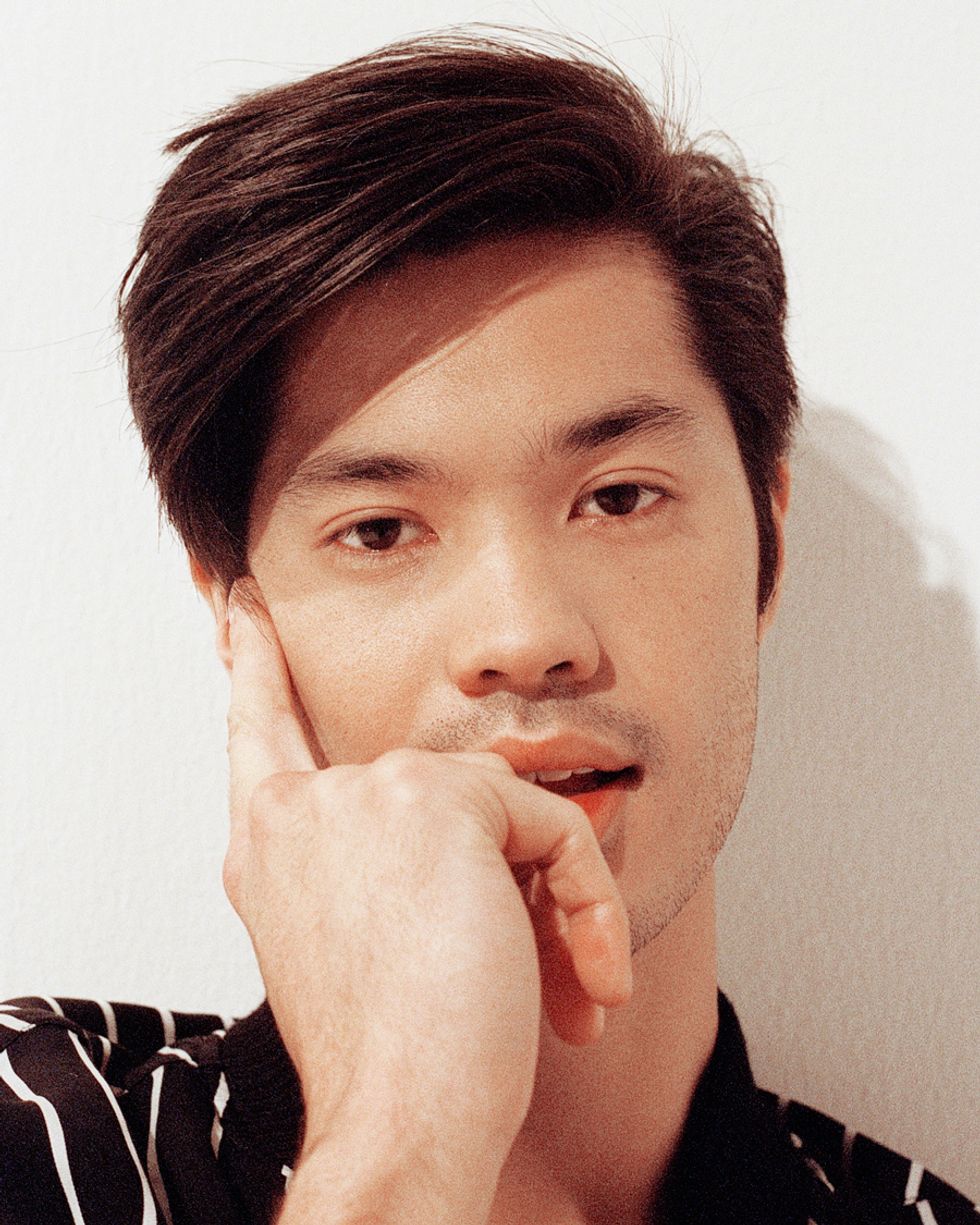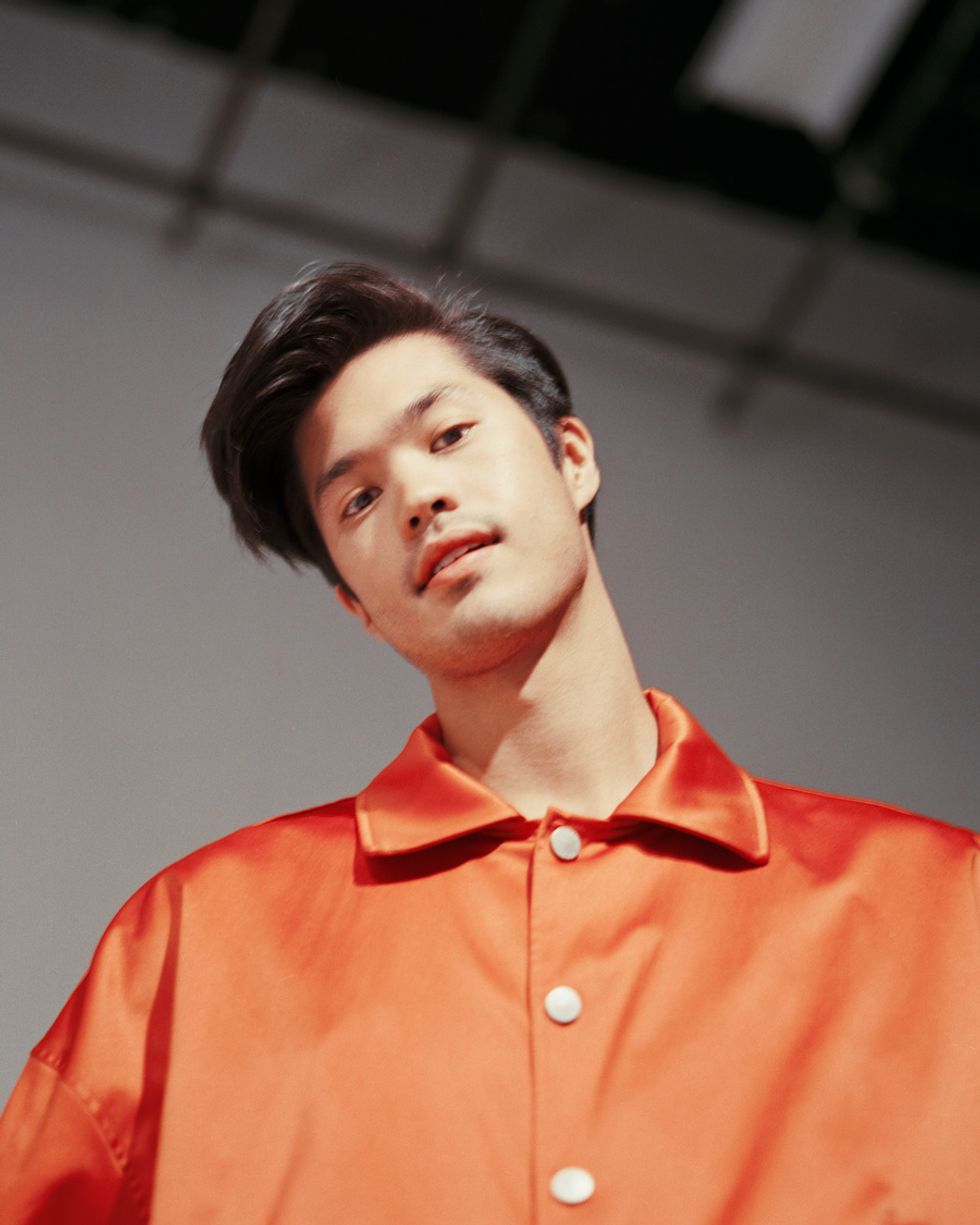
Ross Butler is a name that's about to be everywhere. Though the 28-year-old actor often plays seemingly extroverted jocks on TV, he is laid back and careful with his words when I chat with him. He's had quite a journey to get to where he is now, acting in student films and in Disney Channel shows before landing roles on Riverdale and 13 Reasons Why, and is passionate about bringing as much nuance and humanity to his characters as possible, deeply considering what motivates them and how they navigate through their emotionally fraught high school environments.
Butler began acting at the age of 21 when his friend bought him his first official acting class as a gift. But, he says the deep-seeded love of performance at the heart of being an actor — displayed through the fantastical stories he would tell his classmates —was evident much earlier. "When I was growing up, I gravitated more towards performance than acting," he said. "I feel like I was a pathological liar as a kid. I told my classmates that I was a professional snowboarder at one point. I got a kick out of trying to convince people of things that were absolutely absurd. I always felt compelled to have somebody else's life, but I never looked into it, nor did I consider acting as a career."
After that initial class, he acted in student films and low budget projects. For a few years, there was a lot of financial insecurity and familial stress surrounding his career choice. His mother wanted him to be an engineer, which he had studied for a year at Ohio State, and didn't support his decision to move to California. Though they are on good terms now, there were a few years when the two didn't speak because she saw acting as, "as insecure and frivolous and not a way [he] could support [himself.]"

Butler and I, both Asian-American children to parents and communities that emphasize academic excellence in science and engineering, also recognize that our families' aversion to financially insecure jobs like acting or writing is deeply cultural and, to an extent, practical. Butler said that while pursuing his dreams as an actor, he grappled with the question, "How do I make my dreams fit into the Asian cultural dream? How do I make these two worlds meet?" It's a question a lot of us grapple with, knowing our parents want the best for us and often worked hard so that we have the privilege of choosing a career path different from theirs, while still wishing they were more supportive of our decisions.
He added that he wished he had found ways to pursue creative endeavors earlier in life, saying, "I think the problem isn't necessarily the decision to go into the arts. The problem is allowing Asian American kids to be creative at a younger age so that a choice down this path doesn't seem so radical or out of the ordinary. Because if I had started earlier, I can't speak to how history would have changed, but the transition may have been earlier. "
The general lack of representation of Asian American narratives also makes it harder to see ourselves thriving as anything other than doctors, lawyers, or engineers. Butler was born in Singapore and raised in America, and feels that narratives like his are central to the fabric of American life, but are often overlooked, telling me, "I moved to America when I was 4 and I went to American public school. I grew up around American kids and I'm an American. I was raised in this culture. Telling that story isn't that hard. My mom brought her background of academic strictness, but that didn't define who I was. It's an attribute just like all white Americans have their own unique attributes. Growing up, I wish I had seen the stories I saw, just with Asian characters. I wish there was an Asian version of Tom Hanks, or an Asian American version of Ryan Gosling."
But, despite the hurdles he faced early on, Butler's decision to stick with acting ultimately paid off. He landed roles in Disney Channel shows like KC Undercover and Teen Beach 2. Working with 17-year-old Disney Channel stars "who had been working their whole lives" at the age of 23 was intimidating at first for Butler, but ultimately led to an important turning point in his career. Around that the time he began working with Disney, he felt more confident and "started talking about acting less as a hobby and more as a business."
Related | Beautiful People: Kimberly Drew Is the Future of the Art World
The switch from hobby to career was an exciting but at times daunting one. As most people working in creative field know, it's thrilling to make a living off your art, but also disheartening realization that art must necessarily be commodified in the process — you have to ultimately view your work in terms of money in order to make a living. Ross tells me that the business side of being an actor or a creative i "not something you want to be conscious of as a creative, but it is our job. It's the price you pay for wanting to do what you love as a job." It's discouraging at first, he continues, but "ultimately in the end, we all have to become adults. We can still play in some areas."
More recently, Butler has worked on dramas like Riverdale, the Archie Comic-meets-Twin Peaks cult favorite, and 13 Reasons Why, the Selena Gomez-produced Netflix drama that tells the story of high school student Hannah Baker's decision to commit suicide. Both shows have been massive successes, and 13 Reasons Why 's second season just premiered today.

Butler has played jocks on both shows and says he worked hard to show what made Zach Dempsey, his character on 13 Reasons Why, special, finding that as a "social chameleon" who "didn't really fit 100% into any of the cliques," he was able to relate to the person Zach is at his core. "Zach is this lonely kid who is seen as one of the popular jocks," he said. "That feeling of not fitting and feeling isolated is something that I'm not unfamiliar with. Growing up, I felt like I never really fit in anywhere, so that wasn't too hard to connect to. Zach is at odds with trying to find out if he wants to follow what his morals say, or if he wants to stay popular."
That tension between fitting in and following one's moral compass is central to the show's storyline, which implicates 13 people in Hannah's decision to commit suicide via 13 audio tapes she left behind. The severity of each person's crime varies, but everyone nonetheless contributed to the emotional pain and isolation she felt as a young woman who had recently moved to a new school.
Zach is one of the people Hannah mentions in her tapes. She blames him for throwing away notes she received from a secret admirer and for eventually throwing away a note she wrote to him. In reality, Zach didn't actually throw away her note, but he also never tried to reach out and help her despite knowing his friends were bullying her.
Some viewers felt that, since he didn't explicitly do anything wrong, Zach shouldn't have been on the tapes, but Butler tells me he feels Zach deserved to be criticized "because what he did contributed. It wasn't as harsh as some of the other tapes, but it definitely was a contribution because of the relationship that Hannah and Zach had," adding that, "A big secret is revealed about that in Season 2 and it makes a lot more sense."
Related | Beautiful People: Kali Uchis Is a Self-Made Pop Star
As a viewer, it felt like tapes like Zach's were crucial because they showed that trauma is inflicted in varying scales, sometimes in seemingly inconsequential ways, and that someone's personal struggles are always deeper and more complicated than they seem at a cursory glance.
Zach's tape is also interesting because it is the first to introduce multiple perspectives to the narrative. Hannah was certain she saw Zach throw away a note she wrote him, but in reality, he kept it. It was the first episode that introduced the concept of subjectivity and that reminded the viewer that we were learning about the narrative from Hannah's perspective. Butler says the episode "shows that someone can see things or feel like they know things that aren't true," even if they're not "lying or trying to deceive people."

The second season, which tells multiple characters' stories, tries to fill in some of the narrative gaps caused by hearing only Hannah's side of the story. The writers meticulously combed through the first season while writing the second to make sure all the newly-revealed secrets aligned with the original storyline.
In this season, we learn a lot more about Zach and Hannah's relationship, too. We see that they had a deeper bond than we were initially led to believe and watch his difficult road to emotional recovery in the wake of Hannah's suicide, which Butler says is rife with guilt and anxiety. "You get to see Zach unfettered," he says, adding that Zach "starts to lose control of his psyche. He has moments where it's hard for him to come to terms with what happened, but as time goes on, because of the stress he's going through, he becomes more galvanized in wanting the truth to come out, and takes a stronger stance. He makes a decision to go with an unpopular opinion and he does what he can to help reveal the truth. Zach decides to take the route that will ultimately make him stronger and a better person."
The first season of the show faced criticism for its graphic portrayal of Hannah's suicide, which many people felt could be triggering to viewers or could glamorize the act. The episode in which Hannah commits suicide is in fact incredibly dark and difficult to watch, and much of the criticism came from psychologists or therapists. When asked about the conversation surrounding the show and its portrayal of suicide, Butler said he feels that showing how and why suicide happens and how it affects a community sparks necessary conversations about mental health. Selena Gomez and her mother, Mandy, pitched the show to many networks, he says, but refused to put it out with any that prevented them from showing the suicide because they felt "portraying the suicide is what makes it real, what makes it feel like it has stakes, and makes it so that it isn't glamorized." He adds that since the show premiered, most of the people who reach out to him tell him the show gave them language to talk about their struggles. He says, "a lot of people telling me that they were able to talk to their parents about it. It's very inspiring and very motivating. It felt special to feel like I've had an impact on people's lives beyond just telling a story. I've gotten them to open up to their parents more."
With two major shows and countless other projects under his belt, Butler is already making his mark on Hollywood. But with his newfound clout and confidence, he hasn't lost any nuance or thoughtfulness. He represents so many different communities and narratives, and the second season of13 Reasons Why allows him to pry apart those overlapping identities. He is, ultimately, grateful for the platform 13 Reasons Why has given him, and is constantly considering ways to give his job and his characters meaning.
Photography: Kelia Anne
Styling: Morgan Pinney
Grooming: Dillon Peña
Photographer's Assistant: Cailan O'Connell
Location: Goya Studios